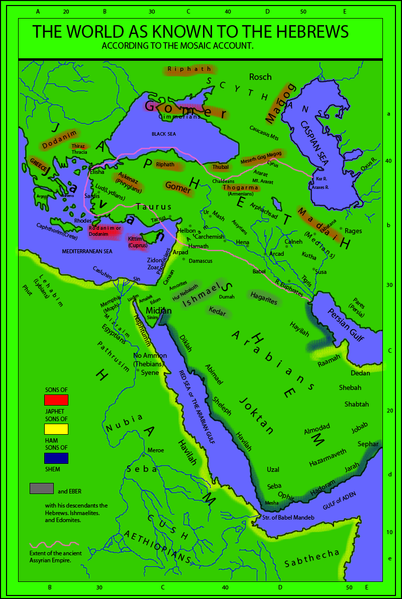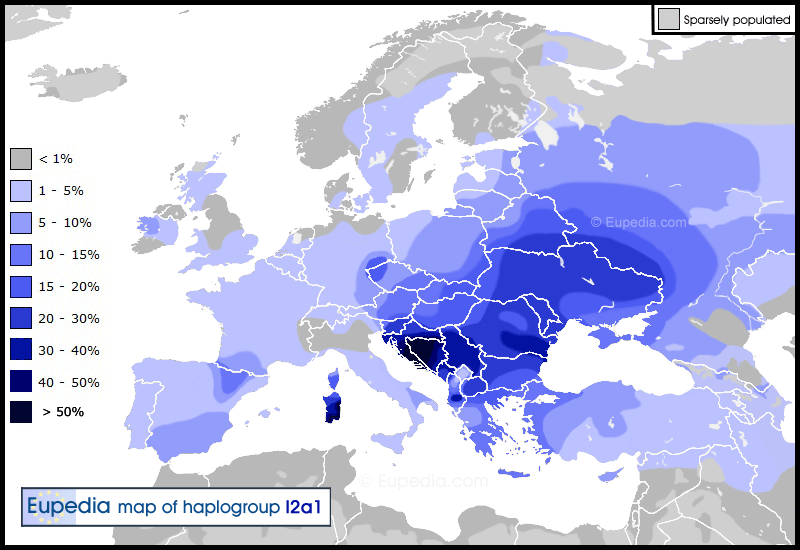how yes no 2
Junior Member
- Messages
- 863
- Reaction score
- 3
- Points
- 0
there is no provable link between Adriatic Veneti and people who lived in town of Veneto at times when medieval Venetian republic was created.... there is a gap of like thousand years...... only link is name of Adriatic Veneti preserved in name of town of Veneto that was later centar of republic that was named Venetian republic after it....They did find J in the plains of Veneto, where it was found that 55000 Venetians that migrated to crete in the 13th century and 40000 returned between 1602 and 1670.
interesting, but how on earth can anyone guess haplogroup of Cimbri? no remains, no population is confirmed to origin from them... and T is very exotic haplogroup for Europe...BTW, they also found T in the alp of the veneto due to the Cimbri who originated from Jutland Denmark.
if you look at Slovenes...their name in early medieval period was Carantanians, which may be same tribal name as Carni...Also, the Carni seem to be a mix of Celtic and Venetic, when originally scholars said they where Illyrian. IIRC Carniola region was named after the carni
Slovene people are mix of R1a, I2a2 and R1b...
Lastly...Roberto Salinas Price wrote in 1995, that the Trojan war was based in Dalmatia and the trojans where illyrians and their neighbors where the Dardanians . Scholars have recently said while Mr. Price is correct that TROY was not where we are told it was, they have doubts that it was in Dalmatia.
Roberto Salinas Price is philologist and amateur archeologist
he argues that ancestors of modern Greeks came to region much after Trojan war and have adopted epic songs.... he also believes that Iliad was originally written in proto-Slavic language.... hm, regarding that I need to notice that word Homer may be corruption of Gomer... though, Gomer are Cimmerians... and I2a2 probably...
anyway, from his website
http://www.homer.com.mx/Time_Line/Trojan_Diaspora.htmlIt is at the time of the Trojan War (or better yet, at the time of the Fall of Troy, c. 1,200 BC) that the term "Illyrioi" comes into historical being as a collective name for a number of independent albeit closely related tribes of a common Slavic stock.
http://www.homer.com.mx/index.html
I myself believe that Slavic people origin from Venetic people, and that Illyrians were something else...
but who knows?
e.g Iapetoc thinks proto-Slavic were Thracians
but on his topic about ancient Thracians, I show that Slavic languages are very related to what is thought to be few preserved Illyrian words, while not related at all to Thracian...
http://www.eupedia.com/forum/showthread.php?p=367548#post367548
actually, there is lot of confusion between Greek notion of Illyria and Roman province of Illyricum...
Greek notion of Illyria was more or less Albania of today plus parts of Montenegro... and Roman provice of Illyricum is more or less ex-Yugoslavia..... so, I think that good match of the few preserved "Illyrian" words with Slavic and no match with Albanian is in fact due to words probably being from Roman province of Illyricum but not from real Illyria.... Roman empire made same confusion everywhere - Macedonia was shifted north, Raetia was shifted east to include Vindelici.. perhaps that was special tactic to brake national identities....
e.g. if we imagine that USA took over Europe and make USA province of Germany to be Bohemia and north France, province of Poland to be east Germany...province of Hungary to be Slovakia, province of Slovakia to be Czech republic, province of Czech people to be Bavaria....
there are three factors:
1) own tribal name used for foreign people, results in lack of willingness to identify with that tribal name
2) living in a land that is not named after them also has a factor of feeling foreigner, but belonging to Roman empire makes them not foreigners...
3) this is also part of 'divide et impera' strategy...because if for instance people A know that land A is their neighbor, after awhile they will start to believe that that country was originally theirs and that it belongs to them....
if people are forced to use those wrong names for longer period, they will just lose national identity much easier than if they kept tribal names... I guess that is how Roman empire managed to be so successful melting pot in which many national identities were lost...
province of Illyricum was at least partly settled by Venetic people, and we know that Jordanes in 6th century speaks of Slavic people as part of Venethi race....
I think Venethic people were I2a2 with some R1a, Illyrian and Dardanian (and perhaps Thracian) were E-V13 with some R1b and J2









